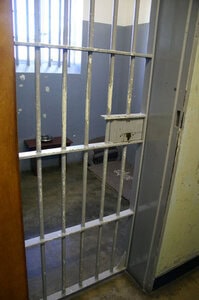Nelson Mandela’s Long Walk from a Cell to Freedom
“I found solitary confinement the most forbidding aspect of prison life. There is no end and no beginning; there is only one’s mind, which can begin to play tricks. Was that a dream or did it really happen? One begins to question everything.”
–Nelson Mandela, from his 1994 autobiography The Long Walk to Freedom

Nelson Mandela was released 20 years ago today after spending 27 years in prison. He had received a life sentence in 1964 for conspiring against the apartheid regime, and spent the first 18 of those years on Robben Island, off the coast of Cape Town. There, along with other leaders of the liberation movement, Mandela was housed in a special section of the prison and did hard labor in the island’s lime quarry. He was allowed one visit a year and one letter every six months. Mandela spent brief periods in solitary confinement, but he also managed to earn a law degree and establish himself as a leader among his jailed comrades.
Mandela’s period of real isolation began in 1982, when he was transferred from Robben Island to Pollsmoor Prison on the mainland. By then, Mandela had become a world famous symbol of his cause. His supporters believed the move was made because he was exerting too great an influence on younger prisoners brought to the island prison, which had become known as “Mandela University.”
Mandela spent much of the next six years in solitary confinement. In 1988, after spending time in the hospital for tuberculosis, he was moved to Victor Verster Prison, where he lived under less harsh and restrictive conditions, and entered into clandestine negotiations with the government to bring an end to apartheid. In 1990, amidst international pressure, he was released from prison at the age of 71.
Here is the BBC’s description of what happened on February 11, 1990, when he walked out of the prison’s gates:
Leading anti-apartheid campaigner Nelson Mandela has been freed from prison in South Africa after 27 years.
His release follows the relaxation of apartheid laws – including lifting the ban on leading black rights party the African National Congress (ANC) – by South African President FW de Klerk.
Mr Mandela appeared at the gates of Victor-Verster Prison in Paarl at 1614 local time – an hour late – with his wife Winnie.
Holding her hand and dressed in a light brown suit and tie he smiled at the ecstatic crowds and punched the air in a victory salute before taking a silver BMW sedan to Cape Town, 40 miles away.
People danced in the streets across the country and thousands clamoured to see him at a rally in Cape Town.
COMMENTS POLICY
Solitary Watch encourages comments and welcomes a range of ideas, opinions, debates, and respectful disagreement. We do not allow name-calling, bullying, cursing, or personal attacks of any kind. Any embedded links should be to information relevant to the conversation. Comments that violate these guidelines will be removed, and repeat offenders will be blocked. Thank you for your cooperation.
I can totally relate to Mandel’s opening quote.
The system needs “Plausible Denial” a term I learned while working in D.C. Inmates doubt their own experiences under this system so how can they confront it? Public shame and the fear of exposing themselves to retribution by the establishment further protect the systems practices. I have been reluctant to tell my own story about a suicide I witnessed in solitary on Christmas Day 1968. I had Christmas dinner with an obviously disturbed young teen in what can only be called an extraordinary experience for inmates in solitary confinement. We were allowed only this once to eat our Christmas Dinner in small groups. I could tell the inmate sitting across from me was in need of mental health care as he told me of his plans to fly home soon. After our dinner he was again let out to shower. The teen chose this time to dive off the 3rd floor railing landing head first onto the atrium below. Before he leap he proclaimed “I can fly I can fly! You can’t keep me there no more!”
This all took place out of my direct sight so I could only listen to the proclamation of the teen and the sickening thud of his impact. Officers would not confirm my suspicions and now the incident does in deed seems like a bad dream.
As Mandela wrote: “Was that a dream or did it really happen? One begins to question everything.”
And what has happened to the ANC? Does anyone know?